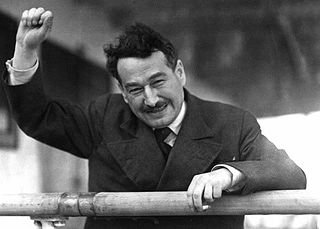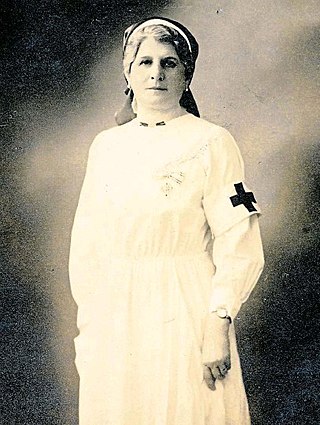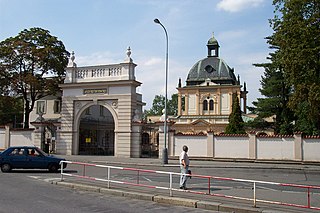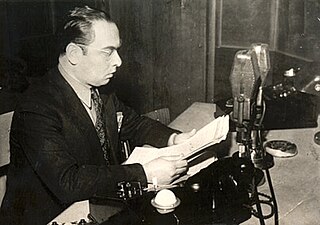Related Research Articles

Max Brod was a Bohemian-born Israeli author, composer, and journalist.
The German-speaking population in the interwar Czechoslovak Republic, 23.6% of the population at the 1921 census, is usually reduced to the Sudeten Germans, but actually there were other German ethno-linguistic enclaves elsewhere in Czechoslovakia inhabited by Carpathian Germans, and among the German-speaking urban dwellers there were ethnic Germans and/or Austrians as well as German-speaking Jews. 14% of the Czechoslovak Jews considered themselves as Germans at the 1921 census, but a much higher percentage declared German as their colloquial tongue during the last censuses under the Austro-Hungarian Empire.

Helmut Flieg or Hellmuth Fliegel was a German writer, known by his pseudonym Stefan Heym. He lived in the United States and trained at Camp Ritchie, making him one of the Ritchie Boys of World War II. In 1952, he returned to his home to the part of his native Germany which was, from 1949 to 1990, the German Democratic Republic. He published works in English and German at home and abroad, and despite longstanding criticism of the GDR remained a committed socialist. He was awarded the 1953 Heinrich Mann Prize, the 1959 National Prize of East Germany, and the 1993 Jerusalem Prize.

Egon Erwin Kisch was an Austrian and Czechoslovak writer and journalist, who wrote in German. He styled himself Der Rasende Reporter for his countless travels to the far corners of the globe and his equally numerous articles produced in a relatively short time, Kisch was noted for his development of literary reportage, his opposition to Adolf Hitler's Nazi regime, and his Communism.

Hermann Grab was a Bohemian German-language writer.

Pavel Eisner, also known as Paul Eisner and under the pseudonym Vincy Schwarze, was Czech-German linguist and translator and the author of many studies about Czech language. He is considered one of the most important Czech translators of all time and was said to be proficient in 12 languages - English, French, Icelandic, Italian, Hungarian, German, Norwegian, Persian, Russian, Serbian, Spanish, and Tibetan. He produced some of the earliest Czech language translations of Franz Kafka's work.
The Prager Zeitung was a German newspaper in the Czech Republic issued weekly in Prague; it now publishes online only.

Hedwig Rosenbaum, née Hedwig Austerlitz, from 1909 on Hedwig Raabe, in Czech from 1945 (sic!) on referred as Hedwiga Rosenbaumová, was a tennis player who was attributed to represent Bohemia. She won two bronze medals in tennis at the 1900 Summer Olympics in Paris, in the women's singles and the mixed doubles with Great Britain's Archibald Warden. She was the first woman to represent Bohemia at the Olympics.

The New Jewish Cemetery in Žižkov, Prague, Czech Republic, was established in 1890 to relieve the space problem at the Old Jewish cemetery in Žižkov, where the Žižkov Television Tower now stands. It is about 10 times bigger than the Old Jewish Cemetery in Josefov and provides space for approximately 100,000 graves, therefore having the capacity to serve for a whole century. There is also a specially designated area for urns, though the Jewish tradition does not allow cremation. The cemetery is still in use today and operated by the Jewish Community in Prague.

The Prager Tagblatt was a German language newspaper published in Prague from 1876 to 1939. Considered to be the most influential liberal-democratic German newspaper in Bohemia, it stopped publication after the German occupation of Czechoslovakia. The Prager Zeitung, a German weekly published in Prague since 1991, claims to continue the traditions of the Prager Tagblatt.
Manfred George, born Manfred Georg Cohn, later shortened to Manfred Georg, was a German journalist, author and translator. He left Germany after the Nazis came to power, living in several different European countries and eventually emigrating penniless to the United States in 1939. He became the editor of Aufbau, a periodical published in German, and transformed it from a small monthly newsletter into an important weekly newspaper, especially during World War II and the postwar era, when it became an important source of information for Jews trying to establish new lives and for Nazi concentration camp survivors to find each other. George remained Editor in Chief of Aufbau until his death.

František R. Kraus was a Czechoslovak Jewish anti-fascist writer, journalist and editor, member of the resistance movement, sportsman and a known Czech holocaust survivor.
Vlastimil Emil Košvanec was a Czechoslovak painter, graphic designer and illustrator.

František Kubka was a Czechoslovak writer, journalist, diplomat and politician. He was a regular at the "Friday Men" meetings at Karel Čapek's house from 1921–1938. His folk tale of the romance of Peter Vok with a miller's daughter became the basis of the most popular post-war Czech opera, Zuzana Vojířová. He was appointed ambassador to Bulgaria (1946–49).

The Friday Men were a Czech intellectual and political circle that met in the garden of Karel Čapek's Prague house on Friday afternoons from 1921 till Čapek's death in 1938. The group also sometimes met in Café Slavia.

Arne Laurin was a Czech-Jewish journalist. He was editor of the Prager Presse and one of Karel Čapek's Friday Men circle.
The following is a timeline of the history of the city of Prague, Czech Republic.
Prague German was the dialect of German spoken in Prague in what is now the Czech Republic. The written form of this dialect from the Luxembourg rule played an important role in the history of the German language for its balancing function between the written upper Austrian and southern German dialects and eastern Central dialects of central Germany, which later developed the spelling of Modern German writing.

Arijský boj was a pro-Nazi Czech-language weekly tabloid newspaper published between May 1940 and May 1945 in the Protectorate of Bohemia and Moravia. Inspired by the Nazi newspaper Der Stürmer, the newspaper made antisemitism its main theme and was also critical of the Czechoslovak government-in-exile. Denunciations published by the newspaper contributed to the isolation of Jews during the first years of the Holocaust in Bohemia and Moravia.

The Anglo-Czechoslovak and Prague Credit Bank, also known as Anglobanka, was the second-largest bank in Czechoslovakia during the 1930s. It resulted from the merger in 1930 of three Prague-based banks:
References
- ↑ Arne Laurin, Influential Czech Jewish Journalist, Dies in New York; Was 56 Jewish News Archive, New York, 19 February 1945